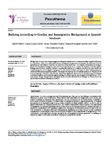Mostrar o rexistro simple do ítem
Bullying According to Gender, and Immigration Background in Spanish Students
| dc.contributor.author | Piñeiro, Isabel | |
| dc.contributor.author | López-Castro, Leticia | |
| dc.contributor.author | González-Suárez, Rocío | |
| dc.contributor.author | Rodríguez, Susana | |
| dc.contributor.author | Valle, Antonio | |
| dc.date.accessioned | 2024-01-23T13:12:21Z | |
| dc.date.available | 2024-01-23T13:12:21Z | |
| dc.date.issued | 2022 | |
| dc.identifier.citation | Piñeiro, I., López-Castro, L., González-Suárez, R., Rodríguez, S., & Valle, A. (2022). Bullying According to Gender, and Immigration Background in Spanish Students. Psicothema, 34(4), 537-543. https://doi.org/10.7334/psicothema2022.36 | es_ES |
| dc.identifier.issn | 0214–7823 | |
| dc.identifier.uri | http://hdl.handle.net/2183/35079 | |
| dc.description.abstract | [Abstract] Background: Boys are more frequent aggressors than girls, but there are no conclusive findings on gender differences in victimization. There is a relationship between immigration background and bullying, but differences between generations are still debated. Therefore, the objectives of this study were: 1) to analyze victimization according to gender and immigration background (first and second generation); 2) to compare the attitudes of students against bullying based on these variables. Method: a multivariate analysis of covariance (MANCOVA) was carried out, considering gender and immigration background as independent variables, and types of offline bullying (physical, verbal and relational) as dependent variables. The sample was made up of 6,335 Spanish students (50.1% girls; 49.9% boys; average age: 15.83, DT: 0.29). Results: Statistically significant differences were detected in types of bullying (considered together) and in attitudes against bullying according to gender and immigration background (p <.001). Conclusions: being a first-generation immigrant stands out as the main risk factor. Findings are discussed as to the need to address cultural victimization in schools. | es_ES |
| dc.description.abstract | [Resumen] Antecedentes: Los chicos son agresores más frecuentemente que ellas, pero no hay hallazgos concluyentes sobre diferencias de género en la victimización. Existe relación entre antecedentes de inmigración y acoso escolar, pero todavía se discuten las diferencias entre generaciones. Por ello, los objetivos de este estudio fueron: 1) analizar el acoso escolar en función del género y los antecedentes de inmigración (primera y segunda generación); 2) comparar las actitudes de los estudiantes contra el acoso escolar en función de dichas variables. Método: se llevó a cabo un análisis multivariado de covarianza (MANCOVA). Las variables independientes fueron el género y los antecedentes de inmigración. Las variables dependientes fueron los tipos de acoso escolar presencial (físico, verbal y relacional). La muestra fue constituida por 6335 estudiantes españoles (50.1% mujeres; 49.9% hombres; media de edad: 15.83, DT: 0.29). Resultados: se detectaron diferencias estadísticamente significativas en los tipos de acoso escolar considerados conjuntamente y en las actitudes contra el acoso en función del género y de los antecedentes de inmigración (p < .001). Conclusiones: el principal factor de riesgo encontrado fue ser inmigrante de primera generación. Los hallazgos se discuten en cuanto a la necesidad de abordar la victimización cultural en las escuelas. | es_ES |
| dc.language.iso | eng | es_ES |
| dc.publisher | Departamento de Psicología de la Universidad de Oviedo ; Colegio Oficial de Psicólogos del Principado de Asturias | es_ES |
| dc.relation.uri | https://doi.org/10.7334/psicothema2022.36 | es_ES |
| dc.rights | Psicothema es una revista de acceso abierto [...]. Los usuarios pueden leer, descargar, copiar, distribuir, imprimir, buscar, o realizar enlaces a los textos completos de esta revista sin pedir permiso previo al editor o al autor, siempre y cuando la fuente original sea referenciada. | es_ES |
| dc.subject | Bullying | es_ES |
| dc.subject | Attitudes | es_ES |
| dc.subject | Gender | es_ES |
| dc.subject | Immigration | es_ES |
| dc.subject | MANCOVA | es_ES |
| dc.subject | Acoso escolar | es_ES |
| dc.subject | Actitudes | es_ES |
| dc.subject | Género | es_ES |
| dc.subject | Inmigración | es_ES |
| dc.title | Bullying According to Gender, and Immigration Background in Spanish Students | es_ES |
| dc.title.alternative | Acoso escolar según el género y los antecedentes de inmigración en estudiantes españoles | es_ES |
| dc.type | info:eu-repo/semantics/article | es_ES |
| dc.rights.access | info:eu-repo/semantics/openAccess | es_ES |
| UDC.journalTitle | Psicothema | es_ES |
| UDC.volume | 34 | es_ES |
| UDC.issue | 4 | es_ES |
| UDC.startPage | 537 | es_ES |
| UDC.endPage | 543 | es_ES |
Ficheiros no ítem
Este ítem aparece na(s) seguinte(s) colección(s)
-
GI-GIPED - Artigos [57]






